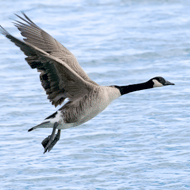
Move follows legal challenge from Wild Justice
Natural England has scrapped general licences for the lethal control of certain wild birds following a legal challenge.
The challenge was launched in February by the group Wild Justice - formed of Mark Avery, Chris Packham and Ruth Tingay.
According to the group, the general licences - which cover 16 bird species including several members of the crow family, Canada geese, some gulls and pigeons - were unlawful.
A statement on the Wild Justice website reads: ‘In essence, these birds can only be killed under certain legal conditions and NE has to be satisfied that those conditions are met before issuing the licences. NE had not satisfied itself of those things and so the licences are not lawful.’
The group said it asked Natural England not to issue the 2020 licences in the same ‘unlawful’ form.
General licences were introduced in the 1990s to allow certain bird species to be legally killed in order to prevent serious damage or disease, to protect public health and safety and to conserve wild birds or flora and fauna.
Natural England revealed it would revoke three general licences from 25 April 2019, following the legal challenge. The public body said it is ‘working at pace’ to implement alternative measures to allow the lawful control of these species where necessary.
In the meantime, an individual licence will be needed to kill any of these birds where there is no reasonable non-lethal alternative.
Natural England’s interim chief executive Marian Spain said: “We recognise this change will cause disruption for some people, but we are working hard to ensure it is kept to a minimum.
"We will bring forward interim measures as quickly as possible as the first stage of our planned review of the licences. We want to make sure our licensing system is robust and proportionate, taking into account the needs of wildlife and people.”
Wild Justice said it was “delighted” with the outcome of the case and would be bringing it to the attention of other statutory agencies in Wales, Scotland and Northern Ireland.
Farming organisations, however, have expressed concern over the decision to revoke the licences at short notice.
Deputy president of the National Farmers Union (NFU), Guy Smith, said: “The NFU has significant concerns about the abrupt withdrawal of these general licences.
“They are absolutely necessary at this time of year when crops are particularly vulnerable to pests. For example, a flock of pigeons could decimate a farmer’s field of crops or lambs could be targeted by crows leaving severe injuries...
“We understand that Natural England will be issuing new licences from next week and for the NFU it is a matter of priority that these licences are issued as soon as possible.”



 Zoetis has launched a new survey to identify management techniques for Equine Herpes Virus (EHV).
Zoetis has launched a new survey to identify management techniques for Equine Herpes Virus (EHV).